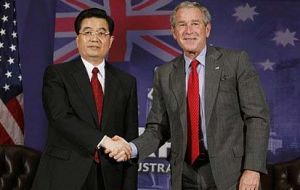MercoPress. South Atlantic News Agency
President Bush presses China on the Yuan and trade relations
 Pte. Hu Jintao and Pte. Bush shake hands after their APEC meeting
Pte. Hu Jintao and Pte. Bush shake hands after their APEC meeting United States president George Bush again pressed on his Chinese counterpart Hu Jintao the need for continuous steps to achieve a free floating Yuan, which would help to address the widening US trade deficit with China.
"He's an easy man to talk to. I'm very comfortable in my discussions with President Hu" Mr. Bush said after the 90 minutes face-to-face meeting on the sidelines of an Asia-Pacific economic summit taking place in Sydney, Australia. Mr. Hu called the discussion "candid and friendly" in a "friendly atmosphere" even though it touched on deep American-Chinese differences. "We both expressed a desire to work toward further development and growth of the business and commercial ties to our two countries," said the Chinese leader. US/Chinese tensions have also grown over the issue of defective products. On Wednesday, Mattel Inc. announced a third major recall of Chinese-made toys in little more than a month because of excessive amounts of lead paint. The world's largest toy maker said the move affects about 800,000 toys. While the official leaders' meetings of the 21-nation Asia-Pacific Economic Co-operation (Apec) forum are not due to take place until the weekend, several bilateral discussions have already taken place on the sidelines. Australian Prime Minister John Howard met Mr Hu earlier on Thursday, and the two countries agreed to hold annual security summits. Mr Bush, meanwhile, began his day by meeting Australian opposition leader Kevin Rudd. Mr Rudd is far ahead of Mr Howard in opinion polls with a general election due later this year. He wants to withdraw Australian troops from Iraq, in contrast to Mr Howard, who has been a staunch supporter of US policy on Iraq. Dan Price, US presidential international economic advisor said that a whole range of economic issues had been discussed by both presidents with exchange rates and the need for the Chinese currency to be more responsive to market influences on the table. "President Hu said China would continue to reform the exchange system leaving markets to play a more active role", indicated Price adding that nevertheless both leaders agreed that reforming the exchange rates system "won't solve our bilateral trade problems". US Congress propped by industry argue China's Yuan is undervalued, giving Chinese exporters an unfair advantage despite China's steps to revalue the currency by 2.1% in 2005 and then letting it appreciate a further 7.3%. US interests are demanding a 30 to 50% appreciation of the Yuan. "We also talked about climate change. We believe that the issue of climate change bears on the welfare of the whole humanity and sustainable development of the whole world. And this issue should be tackled through a stronger international cooperation" said Hu. The Chinese leader did not go further than that, but seeking to reach agreement on ways to control global warming was made a top priority of this year's Asia-Pacific Economic Cooperation forum by Australian President Howard, the host. The US president was invited to next year's Olympic Games in Beijing, an invitation which he said he was "anxious to accept".




Top Comments
Disclaimer & comment rulesCommenting for this story is now closed.
If you have a Facebook account, become a fan and comment on our Facebook Page!